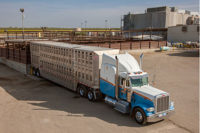
Change is afoot at Niman Ranch — change that the company believes has it in the best position to succeed without altering its core image or watering down its primary principles.
In a span of a few years, Niman Ranch reinvented its go-to-market strategy, renovated the structure of its beef program, reassessed and expanded its geographic reach, and made itself financially viable and strong. Still, the company remains committed to its principles, founded on its mission to deliver the best-tasting meat in the world, explains Jeff Tripician, executive vice president, CMO.
“The brand has always supported superior pricing, and that’s the collection of all the attributes: the quality, sustainable agriculture, family farming, human animal care, no antibiotics, no added hormones,” he says.
“In our eyes, we couldn’t unbundle all those things that go into the product and make it [unique], and still deliver the same end result.”
The changes began in 2006, when Natural Food Holdings purchased 53 percent of Niman Ranch, which had a history of substantial losses to that point.
“Niman was by vast majority a fresh pork company, it was by vast majority in the Bay Area (greater than 80 percent), and it was primarily foodservice [in 2006],” says Jeff Swain, CEO/chairman of Niman Ranch. “We set about in our business plan to modify those situations. Now, we’re nationwide, the Bay Area is 20 percent of our sales and still growing, and we’re now 50-50 retail-foodservice. … We’re also now one-third fresh beef, one-third fresh pork, one-third processed meats. So it’s been a pretty dramatic change in the go-to-market business model.”
The beef program is now an Angus, antibiotics-free, hormone-free and vegetarian-fed program, and the distribution was outsourced. The only changes the new management team made to the pork program was to put more emphasis on processed meats such as bacon, ham, hot dogs and sausage.
These changes helped turn Niman’s fortunes around, and Swain says that in every successive quarter from August 2006 through the first quarter of fiscal 2009, Niman saw increases in sales, gross profit dollars and income from operations. In those same quarters, the company also saw decreases in operating expenses.
“Actually, we broke through into the black in the first quarter of 2009,” he explains. “We had this great trajectory, broke through break-even, and then the grain prices came. Corn shot up to seven or eight dollars, and we immediately had to increase what we pay our farmers because they were under tremendous financial pain.”
Niman initiated a dramatic increase of about 25 percent to their farmers and ranchers under the realization that if those farmers don’t survive, Niman wouldn’t survive either. But the worst wasn’t over.
The credit crunch hit the economy, and Niman’s bank began pulling back on the company’s line of operating capital. In the interest of keeping Niman financially in the black, Natural Food Holdings bought out the remaining Niman shareholders and became 100 percent owners of the company.
“[This] puts us in an ideal place to get through this economic turmoil and come out maybe the last man standing in this segment,” Swain says. “It gives me comfort that, No. 1, we have a strong balance sheet, and No. 2, that we are generating positive cash flow every month now.”
Open wide
Niman Ranch is known for its high-end quality, and its brand name, carries a strong reputation with chefs and retailers who want to communicate their commitment to such industry initiatives as humane animal handling, sustainable agriculture and family farming, among others. Niman’s belief, which is shared by these customers, is that those practices allow it to produce the best-tasting meat available.
However, Tripician says, it was time for Niman to widen the scope of the customers it seeks. First, geographically speaking, Niman had to get past its narrow focus.
“This was a company that believed it was a San Francisco, L.A., Boston and New York brand,” he explains. “I got here and asked why? ‘Why aren’t you a Denver, Toledo, Chicago, Minnesota brand? There are people there who believe [in these practices] too,”
It took Niman two years to build its distribution network to meet Tripician’s challenge, and the company angles to build its penetration in individual marketplaces with an influx of dollars and a new focus on reaching the key players in the markets they’re after.
Second, Niman Ranch was highly selective about the size and scope of the customers with whom it chose to do business. Tripician explains that all the company needed here was a tweaking of the theory behind the practice of selling its products.
“The guy that owns that restaurant on the corner that has 10 tables is just as passionate, just as educated and just as dedicated to the same things we believe, so why shouldn’t he be a Niman Ranch partner?” he says. “So we’re saying that, if you share the beliefs we share, we will do business with you. We wouldn’t have done that a year ago.”
Third, on the topic of product innovation, Niman Ranch has opened the doors to its customers to partner with Niman on new ideas and functions for its products. Tripician says that in the past, Niman might have been more “pompous” about protecting its product, not encouraging customers to tinker and toy with recipes and menu production.
“Now we’re telling our customers that they have the same passion, they can make the innovative product, and if it’s good, we’ll buy it from them and sell it to other Niman customers,” he says.
On the new-product front, this strategy should serve Niman well, especially with a rollout plan that has been modified by the recent economic times. Niman expects to deliver new products through 2009, but the heavy hitters will wait till 2010.
“We think the [2009] economy is one in which the customers won’t really be as open to new product investment and that sort of partnership with us,” Tripician adds. “We’ve got big new product items we’re going to roll out early 2010. We think the economy will turn enough that in January 2010, there will be that pent up demand for new, and we will have a full assortment to launch.”
Partnering to
spread the love
One of the most interesting ventures Niman has embarked upon is its partnership with Dr. Temple Grandin, animal handling and welfare expert and professor of animal science at Colorado State University. Grandin is highly regarded in the industry — both by conventional and niche natural processors — for the role she has played in developing recommendations for providing humane and sustainable environments for animals.
In February 2009, Grandin announced her newest certification program, the “Dr. Temple Grandin Certified, Sustainable & Humane.”
Niman Ranch is acting as the guinea pig of sorts — and as such, will be the first company to carry the label on its products. Grandin will work with any other processor who is interested in becoming certified. (See sidebar on page 19.)
For its many other partners, however, Niman’s big changes are expected to bring positive vibes down the pike. Tripician expects that most every type of partner, from the family farmers to distributors to even the end users, will gain some positive effect from the success these changes bring to the table.
Niman’s network of family farmers can breathe a collective sigh of relief, he says, now that Niman has financial security and stability.
“But, also, we can go to them and say, ‘If you want to grow out your business, we’d like you to, because we intend to need more supply.’” Tripician says. He adds Niman’s distributors should be pleased by the changes, which will allow the company to improve its fill rates down the road.
Niman’s customer base will probably be the least affected, but is still likely to benefit from partnering, too, with a stable and financially secure company that is aggressively growing and expects to expand into other segments and channels of the business, according to Swain.
“We’re going to grow the scope of Niman Ranch,” he explains. “Niman today is beef, pork, lamb, a little poultry, and processed meats, but Niman can be more. It can be more exotic things. … If you look at our portfolio, you might say that we’re in a little bit of chicken, but we’re not in a lot of chicken, or a lot of types of chicken. So those holes, we will try to fill.”
Swain says even longtime Niman supporters should feel secure in knowing that the changes were made with the overall outlook in mind.
“Quite frankly, we have done nothing on the ‘integrity and protocol’ except to improve them and make it stronger,” he explains. “So, to the old Niman supporters, I’d say, ‘We’re better than ever, and quite frankly, more legitimate than ever.’ They should take pleasure in that.”




Report Abusive Comment